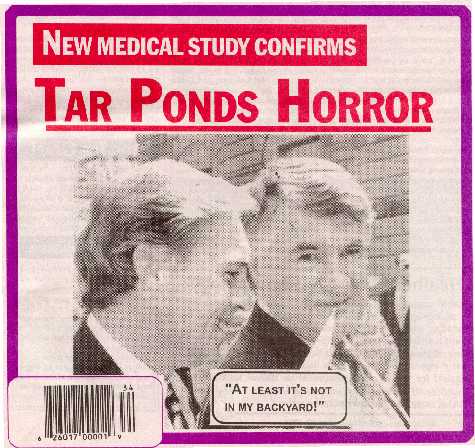Pregnant women living near toxic landfill sites in Europe have been found to have a 33 percent greater chance of producing children with serious birth defects, according to a UK study published last week.
Spina Bifida, holes in the heart, malformation of major blood vessels and a host of other defects were identified in women living within 1.8 miles of dumps containing highly dangerous chemicals and heavy metals. A team from the London School of Hygiene and Tropical Medicine surveyed 231 landfills in Britain, France, Italy, Denmark and Belgium and their conclusions seem to justify the concerns being expressed by the Frederick St. residents.
They say they are suffering from a variety of physical and stress related illnesses resulting from the close proximity of their homes to Canada's worst area of environmental contamination.
With an estimated 700,000 tons of polycyclic aromatic hydrocarbons and polychlorinated biphenyls filling the site, the tar ponds and a neighbouring landfill site are thought to be leaching 10,000 tons of contaminated sludge a day into Sydney Harbour.
The latest tests of the surrounding land area conducted by Elizabeth May's Sierra Club of Canada, found an area near the perimeter of the former coke ovens contained 13 times higher than acceptable levels of arsenic and elevated levels of several other chemicals and heavy metals.
 Premier
Russell MacLellan told them recently he is perplexed why a solution to
the tar pond problem has been so intractable. He promised to give
it priority, personal attention. But he said he didn't want to "politicize"
it and warned that nothing would happen overnight. And it hasn't.
Premier
Russell MacLellan told them recently he is perplexed why a solution to
the tar pond problem has been so intractable. He promised to give
it priority, personal attention. But he said he didn't want to "politicize"
it and warned that nothing would happen overnight. And it hasn't.
But the results of the British study might give him some impetus. It said the greatest risk is posed by heavy metals and an array of dangerous chemicals including industrial solvents, pesticides, arsenic and cyanide.
The team led by Prof. Stephen Palmer of the University of 'Wales College of Medicine found "a significant cluster" of gastroschisis births (with organs protruding through the stomach) and other defects.
Cantox Environmental, a private consulting company, has been engaged by Ottawa and the province to do a health risk assessment of people living in the tar ponds area. A similar study done by the company in Halifax resulted in the closure of the former VG Hospital's medical waste incinerator.
Hair and blood samples have been taken from members of 13 families living on Frederick St. by Dr. Geoff. Scott of the NS Dept. of Health to test for arsenic and other contaminants. But as of late last week results had not been revealed.
According to Laura Lee Langley, recent tests by Nova Scotia's Environment Department also found evidence of arsenic and other contaminants in the Frederick St. area but they were significantly lower than those that Elizabeth May's group turned up.
"We are trying to resolve this mess. A joint action group has been set up and a lot of effort is being put into finding a solution," Laura Lee assured me.